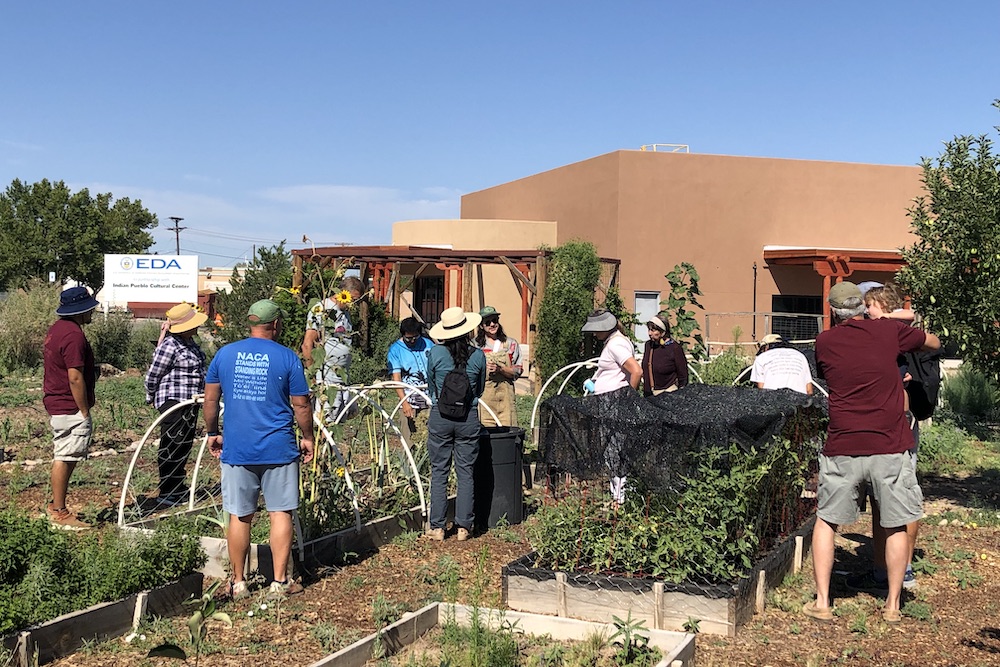
- Details
- By Chez Oxendine
- Food | Agriculture
Bryce Townsend, a San Felipe Pueblo farmer, navigates the complexities of food distribution to multiple Native communities each week through his farm, Black Mesa.
Townsend sources food from his farm and other suppliers, stores it, and assembles the packages for delivery — a logistical challenge for the small-scale Black Mesa, which lacks the equipment, infrastructure and, especially, refrigeration to streamline the operation, he told Tribal Business News.
Those weekly challenges convinced Townsend to sign up as one of the first clients for the new Indian Pueblo Entrepreneurial Complex (IPEC).
The IPEC is an offshoot of the Indian Pueblo Cultural Center, a nonprofit organization operated by the 19 Pueblos in and around the Albuquerque area. The 7,500-square-foot facility had a ribbon cutting in late August, and plans to open up to clients in mid September.
By providing access to equipment, infrastructure, and education for local producers, IPEC is one example of Native-led efforts to tie together the food sovereignty movement and economic development. Across Indian Country, tribal communities are working to support food entrepreneurs, such as restaurateurs, growers, and food processors.
In addition to a commercial kitchen, IPEC offers clients a place to process and then cold-store their food. That gives Townsend a one-stop place to process and wash his food, keep it fresh in cold storage, and assemble the packages to send out.
“Having this space has been vital,” Townsend said. “I really haven’t been in a space like it. I think that the more people that have access to it, the more people can push their products and food businesses to another level.”
That’s the goal, according to IPEC Executive Director Bill Stimmel. The complex is there for Native and local growers, producers, and aspiring food entrepreneurs to access amenities like cold storage, take classes on both business and food subjects, and make use of commercial space. By supporting Pueblo food entrepreneurs, IPEC aims both to launch Native-owned businesses and support food sovereignty.
Food sovereignty is a growing ideal in Indian Country. The concept centers on building self-sustaining food systems independent of wider supply chains, improving both food security and widening access to traditional foods. Recent disruptions with the Food Distribution Program on Indian Reservations (FDPIR) have further highlighted the need for more localized and resilient food systems.
“Our clients or potential clients define success in different ways. In some ways, it's profit and loss, scaling up and growing the business and all of that, but we have many other ways to define success,” Stimmel told Tribal Business News. “We have some clients who are looking to improve food security in their pueblos and their neighborhoods, and with some clients, they're looking to try and move toward food sovereignty, growing as much produce as they can and really embracing agriculture in those ways.”
In addition to cold storage and a food processing area, IPEC features a demonstration kitchen for holding food classes, as well as a commercial kitchen for use by local businesses like Black Mesa Farms. The facility also provides a community garden and its own restaurant, which sources most of its food from local producers, Stimmel said.
"We're not just providing physical infrastructure; we're fostering a community of support and learning," Stimmel said. "We're really set up to be able to help business owners wherever they're at."
IPEC is just one example of the ways in which Native-led organizations and communities are blending food sovereignty and economic development. Other examples include national efforts like the Intertribal Agriculture Council’s Intertribal Food Business Centers Program, which leverages regional hubs to provide technical assistance and grant funding to Native food entrepreneurs.
There’s also localized efforts like the Indigenous Food Lab, which opened in 2023 under the nonprofit North American Traditional Indigenous Food Systems (NATIFS). The Indigenous Food Lab is a combination of restaurant, market, and training center that provides local producers in the Minneapolis-based nonprofit’s area with market space and education opportunities.
“We work to broaden access to Native-made goods and allow people to experience contemporary Indigenous offerings while empowering entrepreneurs to expand their audience,” the organization wrote on their website. “[We] aim to promote Indigenous foodways education and facilitate Indigenous food access.”
The recent food sovereignty-specific efforts are part of a larger move by tribes starting business incubators as a means to drive economic development and reduce capital outflow from their communities. The Navajo Nation’s Change Labs in Tuba City, Ariz. exemplifies the model, offering business classes, entrepreneurial support, and market space to Native Americans.
By providing essential resources and infrastructure, these incubators aim to foster local entrepreneurship, retain more economic activity within reservations, and build self-sustaining tribal economies. This approach addresses "economic leakage," where a significant portion of income flows out of reservations, and helps to bolster the capacity of Native-owned businesses.
